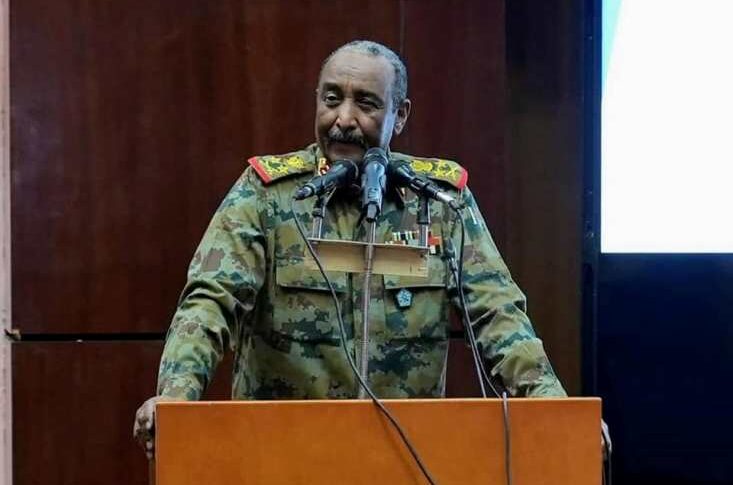Sudanese military offers conditional ceasefire, call for inclusive political dialogue
July 13, 2023 (KHARTOUM) – The Sudanese Sovereign Council announced on Thursday its readiness to halt the war with the Rapid Support Forces (RSF) under the condition that the RSF ceases attacks on civilians and engages in inclusive political dialogue.
These statements were made shortly after the conclusion of the Conference of Sudan’s Neighbouring Countries in Cairo, where participants called for a comprehensive political solution to the crisis in Sudan following a three-month conflict between the army and RSF paramilitary forces.
As a result, the summit decided to establish a ministerial mechanism at the foreign ministers’ level, tasked with developing an executive action plan that includes viable solutions to end the fighting in Sudan.
According to the Sovereign Council, “the army is ready to immediately cease military operations if the rebel militia commits to discontinuing attacks on homes, neighbourhoods, civilian objects, government facilities, and ceases blocking roads and engaging in looting.”
Army Commander in Chief Abdel Fattah had previously stated that military operations against the Rapid Support Forces would only cease if these forces were removed from Khartoum.
Earlier, Yasir Alatta, Assistant to the Army Commander in Chief, had made a similar statement on May 10, affirming that the objective of the Jeddah process was to relocate RSF forces from Khartoum and confine them to a single camp, paving the way for a Disarmament, Demobilization, and Reintegration (DDR) process to integrate them into the army.
The presence of RSF in Khartoum’s residential areas, their looting of properties, and occupation of houses and public facilities have reinforced the negative image of these militias, predominantly composed of Darfur Arab militiamen who have been implicated in war crimes during the counterinsurgency campaign in western Sudan.
The Sovereign Council further emphasized that the army is committed to initiating a political dialogue immediately after the cessation of hostilities, with the aim of forming a civilian government that will lead the country during a transitional period culminating in inclusive elections involving all Sudanese citizens.
The statement welcomed the outcomes of the summit of Sudan’s neighbouring countries, expressing the government’s eagerness to cooperate with all parties striving to end the war and restore security. However, it refrained from mentioning the internationally-backed IGAD process on Sudan.
In response, the Ministry of Foreign Affairs stated that the Sudan Neighbourhood Summit’s statement was balanced and did not include any negative references undermining the country’s sovereignty. The ministry expressed willingness to collaborate with the ministerial mechanism established by the summit.
Two days prior, the Ministry of Foreign Affairs had rejected IGAD’s call for a regional summit to discuss the deployment of the Standby Force in East Africa “ISAF” in Sudan, considering it an act of aggression. Sudan also rejected the appointment of the Kenyan president to chair the IGAD quartet group tasked with resolving the conflict, citing a lack of necessary neutrality.
This position aligns with Egypt’s demand to be included in any Sudan-related processes, as they refuse to be excluded, as was the case in the Naivasha process concerning South Sudan. Cairo also believes that the dispute over the Nile water requires active involvement beyond Ethiopia.
In a positive response, the RSF welcomed the outcomes of the Cairo summit, viewing them as consistent with regional and international efforts to end the war and establish a comprehensive solution. The paramilitary group declared its complete readiness to cooperate with all stakeholders within and outside the country to resolve the Sudanese crisis and restore the path to civil democracy.
The Forces for Freedom and Change (FFC) called for integrating neighbouring countries’ efforts with those of the regional and international community, emphasizing the need for close coordination to cease hostilities and pave the way for peace and democratic transition.
The coalition of pro-democracy political groups welcomed the neighbouring countries’ call for a ceasefire and non-interference, which hinder efforts to contain the war and prolong its duration.
In a statement on Thursday, they reiterated their appeal to Sudanese anti-war political and civil forces to expedite the unification of their efforts in ending the conflict and confronting the polarization that fuels war rhetoric and animosity.
In a related development, the two major democratic forces, the Justice and Equality Movement (JEM) and the Sudan Liberation Movement led by Minni Minnawi (SLM-MM), released separate statements expressing their appreciation for the neighbouring countries’ declaration.
However, in a Twitter statement, Minnawi criticized the presence of FFC groups in the quartet meeting in Addis Ababa while welcoming the participation of all neighbouring country leaders at the Cairo meeting.
(ST)

